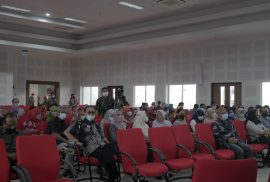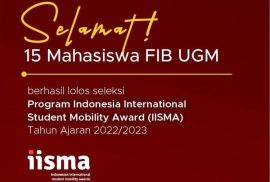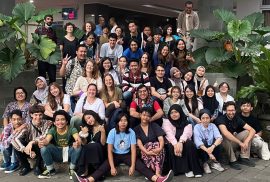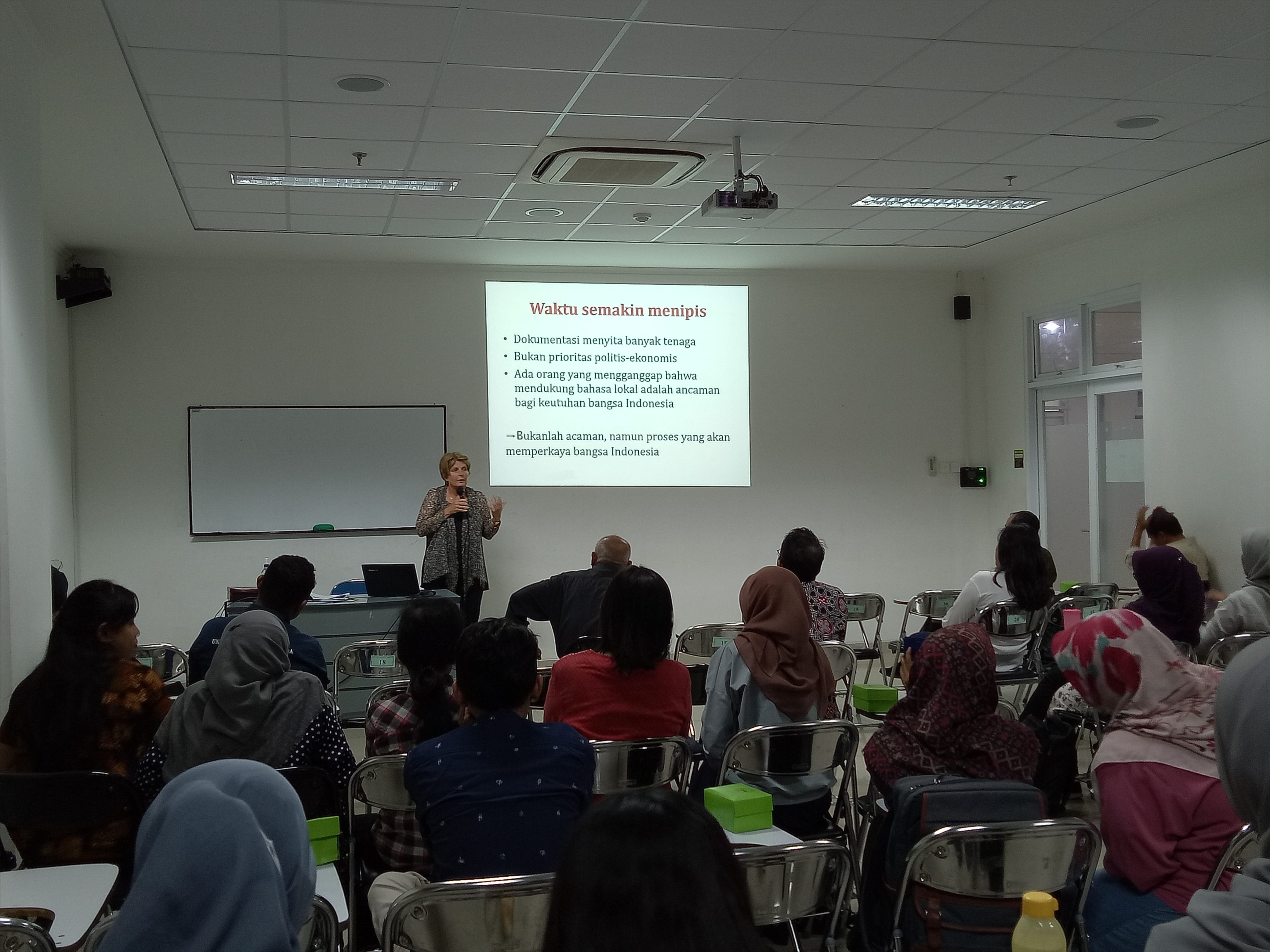On August 27, 2022, at Soegondo Building, a meeting was held between the Faculty of Cultural Sciences UGM and the parents of new students for the 2022 undergraduate program. This is an event to strengthen the connection between parents and the Faculty of Cultural Sciences, UGM. Moreover, this meeting was held to congratulate new students who have officially become part of the big family of the Faculty of Cultural Sciences, UGM.
2022
On July 14, 2022, an academic publication workshop was held with Anna M. Gade, Ph.D., and Nurmalia Habibah M.A.
The workshop is expected to improve the quality of academic publications at the Faculty of Cultural Sciences, Gadjah Mada University.
15 student from the faculty of cultural science has chosen to get a fully funded scholarship from the Ministry of Education, Culture, Research, and Technology (Kemendikbudristek) for doing a 1-semester exchange at many leading universities in the world.
Congratulations, Mahadaya!
- Alyarizki Dushanta (Japanese Literature) – Humboldt-Universitat zu Berlin
- Alysia Noorma Dani (Cultural Anthropology) – University of Leeds
- Amirul Hasim Abdullah (French Literature) – Universidad de Granada
- Audrey Samantha (Tourism) – Hanyang University
- Indy Rahmadani (English Literature) – Middle East Technical University
- Jacinda Pielivia A K (Cultural Anthropology) – Universitat Pompeu Fabra
- Leila Emira Roynni (English Literature) – Massey University
- Martha Sarah Natasha (English Literature) – University of York
- Nayla Andhini Permata (English Literature) – University of Leicester
- Nuragny Mustika Putri S (English Literature) – Western University
- Rangga Sanjaya Nadiar (Cultural Anthropology) – University of Pecs
- Swa Sekar Jakti (English Literature) – University of Liverpool
- Triana Deninta N B (Korean Language and Culture) – Lancaster University
- Zahra Auliani F (History) – Humboldt-Universitat zu Berlin
- Zitta Arlivia (English Literature) – University of Warwick
Monday, 4th of July 2022 marked the start of the Department of Cultural Anthropology, Faculty of Cultural Studies, Universitas Gadjah Mada’s collaborative tandem Summer School in collaboration with University of Zurich and University of Bern, and in attendance of students from UGM, Chiang Mai University, Royal University of Phnom Penh, University of Mandalay, and Ha Noi University (USSH).
During the Summer School, the students will undertake several classes on Ethnographic Methods and the newest trends and developments in the Anthropology of Work, as this Summer School will upheld After Covid? Work and Daily Life in Indonesia as its main theme. Students are then expected to produce ethnographic products, including visual, text, and audio, offering insight into Indonesians’ work and life in Indonesia in relation with their working lives post-COVID. Their research will be advised and supervised by
- Prof. Dr. Pujo Semedi (UGM),
- Prof. Dr. Annuska Derks (UZH),
- Dr. Laura Coppens (UniBern),
- Dr. Olivia Killias (UZH),
- Dr. Sita Hidayah (UGM),
- Dr. Pande Made Kutanegara (UGM),
- Dr. Realisa D. Masardi (UGM),
- Dr. Elan A. Lazuardi (UGM),
- Dr. Agung Wicaksono (UGM),
- M. Zamzam Fauzanafi, M.A. (UGM),
- Wahyu Kuncoro, M.A. (UZH)
The Summer School will run from the 4th of July, 2022, to the 22nd of July, 2022. Do say hi if you happen to meet our foreign students on campus!
Language is one of the catches of reality that is used by humans as a means of establishing communication. This product has also been used for thousands of years and has many variations in each hemisphere. At the present, there are at least 7097 languages recorded in the world, and in Indonesia alone there are about 700 languages. That’s a fantastic number, considering that in everyday practice, not a third of that number is the number of languages we speak or speak.
Like natural resources, language can also be destroyed, and now the extinction is insight. Marian Klamer, a professor at Leiden who focuses on Papuan and Austronesian languages, also responds to this phenomenon by documenting and filing it on an online website so that it can be accessed by all parties. Marian’s activities in documenting regional languages in eastern Indonesia were then shared in a discussion session entitled Documenting the linguistic diversity of Indonesia: Time is running out, last Thursday (27/6) at Soegondo 209.
The activity of documenting the language is part of Klamer’s research as a researcher at Leiden University who received a VICI grant from the NWO (Netherlands Organization of Scientific Research) in 2014 which was valid for five years until 2019. In the presentation session, Klamer admitted that there are many languages. local area in eastern Indonesia where the number of speakers is very small, there is even one local language, namely Sar language, which only has one speaker.
The extinction could arise due to several factors, such as migration, the death of the last speaker, and also human intervention. An example of an intervention that is also faced directly in the field is the marginalization of local languages by migrants who come to an area. More or less, according to Klamer’s data, there have been 345 local languages in Indonesia that have become extinct, and of course, it is very unfortunate because no one can replace the position of these languages in society. Loss of language is a form of great loss because each language is the best way to express ideas/ideas, and transfer knowledge and oral traditions that are directly related to the socio-cultural conditions of the speakers.






